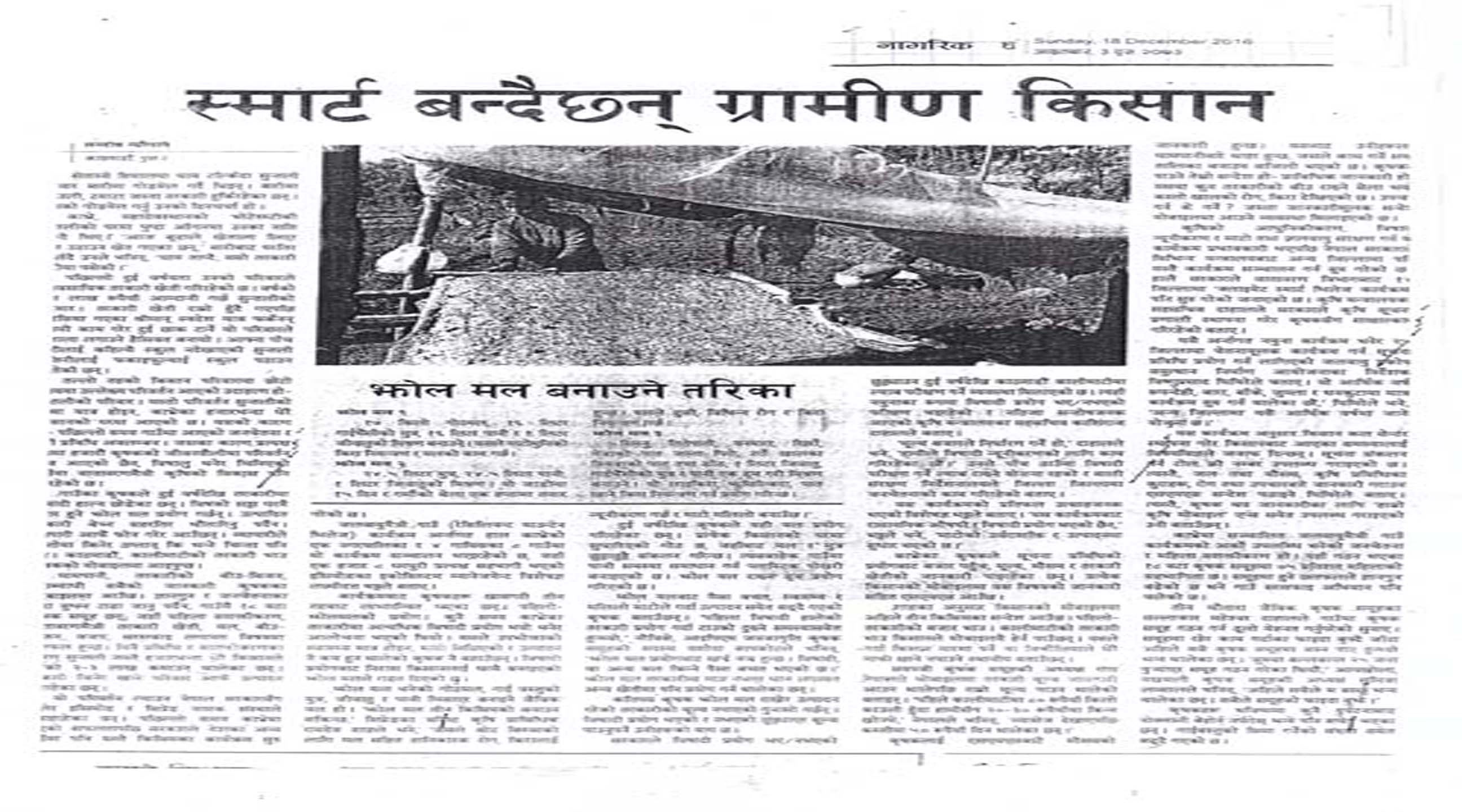Rural Farmers Becoming Smart

Suntali Danuwar, from Kavre, Mahadevsthan, Bhoterumti, along with her husband, works in their Kitchen home garden. Looking after the vegetables has become their daily chore. She and her family has been doing vegetable farming since two years and earn around 3 lakh rupees a year. After the vegetable farming started to do well, her husband, who was in Malaysia, returned back for good and started working as a farmer. Now they can even hire people to work for them. All of her five daughters might be illiterate but, Suntali, now encourages her grandchildren to go to school. Suntali’s family can be considered as one of the examples of a drastic change occurring in a lower class farmer’s family in a very short time. This type of change has occurred not only in her family but in other thousands of family in Kavre. This is all due to awareness and new technology that have developed in the villages because of which environment friendly agriculture is also being developed.
Since two years the farmers in the village has stopped using harmful chemical pesticides. Instead of that they have switched to Jhol Mal which can be easily made in their homes. The villagers do not have to go to the city to sell their vegetables any more as the traders themselves come over to buy them. They also do not have to be worried about being conned by the traders as the value of the vegetables in Kalimati, Kathmandu can be easily accessed from their mobiles. The information about the weather, vegetable seed-sampling, pesticides and fertilizers can also be gained from their mobiles. There are 18 farmers group in the village in which discussions about women empowerment, environmental friendly agriculture, fertilizers, seed-saplings, market, cleanliness etc are done. Hence, due to technology and empowerment, hundreds of people like Suntali have been able to earn 2-3 lakhs per year. In order to bring such a massive change, ICIMOD and CEAPRED have been working in cooperation with the Nepal Government. After the success in Kavre, the government wants to initiate such kind of programs in other parts of the country as well.
According to Laxmi Datta Bhatta, ecosystem management specialist from ICIMOD, Climate Resilient Mountain Village (CRMV) program is being conducted in eight villages from four VDC in which 1,008 households have actively participated. In the program, the main attraction for the farmers was the use of Jhol Mal. Once Kavre was known for using a lot of harmful pesticides due to which not only the users but the farmers themselves complained about it due to the harmful impact on the health and reduced productivity of the soil – things have completely changed after the use of Jholmal. It is simply a biological fertilizer made by mixing dung and urine of the cattle, bacteria and water. According to senior agricultural technician Ramdev Shah, Jhol Mal can be made in three different ways which not only works as a fertilizer but also helps in decreasing the harmful diseases and insects occurring in the plants and increases the soil fertility. The farmers have been using this fertilizer since two years. In order to avoid the shortage of water, they are provided with plastic ponds and to keep the fertilizers separate drums have also been provided. Jhol Mal assures good health, helps save money and increases the fertility of the soil. It can be used in all kinds of farming. The farmers have demanded to separate the price of the vegetables grown with and without the use of Jhol Mal. According to the joint secretary of the Agriculture Ministry, Kashiraj Dahal, the government has been continuously operating a lab test in Kalimati, Kathmandu since 2 years in order to separate out the ones that have been grown with or without the use of harmful chemical pesticides and the results have been found to be satisfactory. The price is determined by the market, says Dahal. He further adds that they have been working for the reduction of the use of harmful chemical pesticides and have also planned for building laboratories in five more places. The Crop Conservation Directorate has also been working in raising awareness to stop the use of harmful chemical pesticides in the crops. Since the farmers get the price of the vegetables through SMS in their mobile the probability of them getting into loss has decreased. They also get the weather forecast due to which it becomes easy for them to work. The farmers also get the information about which crop should be grown in the particular season through SMS. If the program becomes successful in bringing modernization in agriculture, reduction in the use of harmful chemical pesticides and conservation of soil and climate, then similar program will be conducted in other districts as well. Recently the government of the Environment department has also started a ‘Climate Smart Village Program’ in 14 districts.
According to Director of Climate, Disaster Resilience and Construction Project, Bishnu Prasad Ghimire, the information technology is being used as a part of the awareness program. Along with Rupandehi, Bara, Banke, Jumla and Dhankuta, the program is said to be started in other districts as well in this fiscal year itself. According to this program call centers will be built for the farmers where their answers will be answered by the subject expert. A toll free number has also been provided for the collection of the information. ‘Hamro Krishi mobile’ app has also been provided for further information. The other achievements of the climate friendly village are awareness and women empowerment as out of the 18 farmers group, 75% participation is women. Earlier people didn’t wanted to participate in the farmer’s group but now since they have know it’s importance, everyone wants to be a part of it. Now the farmers are quite aware about how to avoid the future loss or accidents so they have also started doing cattle insurances.

